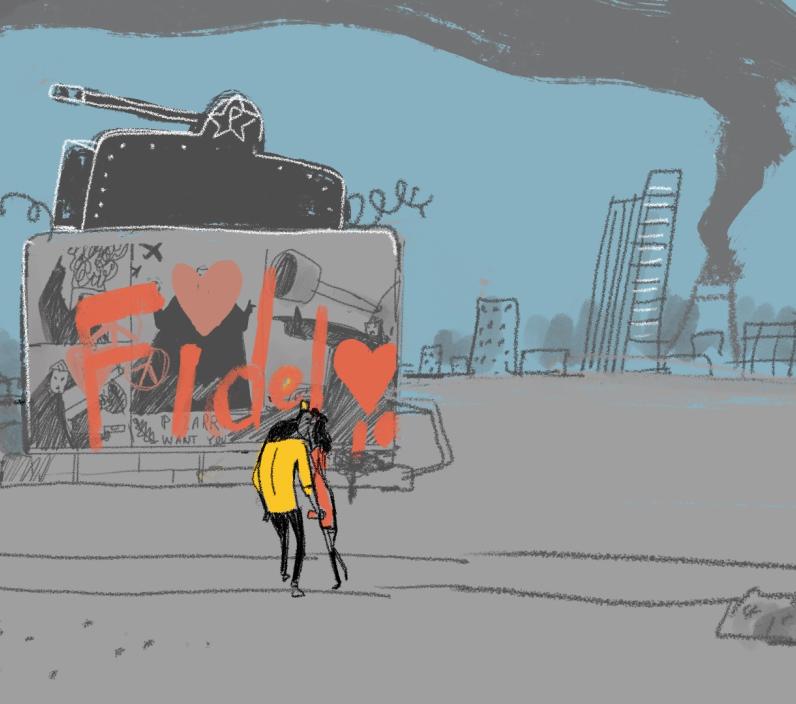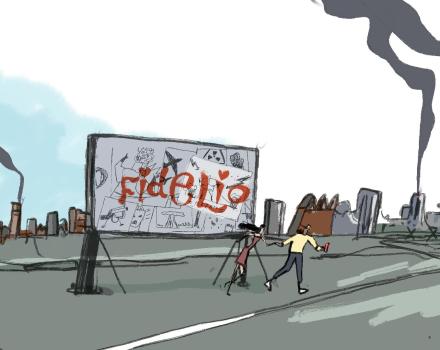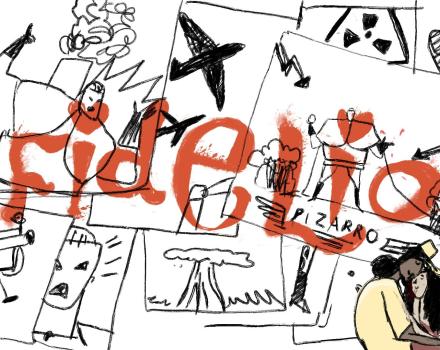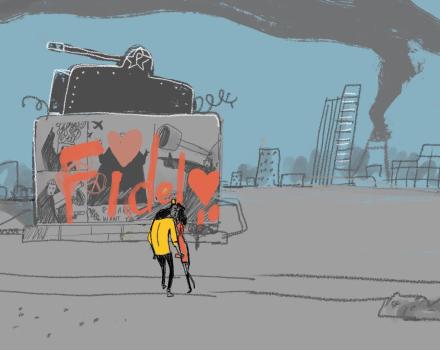

Fidelio short animation

A young couple dreams of a better world, but is confronted with bitter reality when one of them is imprisoned for his ideals. If she wants to see her lover alive again, she will have to find a way to free him...
In this animated version of Fidelio, the cliché of the Beauty waiting to be rescued by Prince Charming is seriously debunked. Leonore herself braves a thousand dangers to free her imprisoned lover. Commissioned by OperaVision and the Belgian artist collective WALPURGIS to celebrate the Beethoven anniversary and World Opera Day, director Judith Vindevogel and animator Roman Khochkov have condensed Beethoven’s masterpiece into 15 minutes for young audiences - a ‘lifesaving opera’ about humanity and love.
Cast
Music | Ludwig van Beethoven |
|---|---|
Music | Ludwig van Beethoven |
Concept, script & direction | Judith Vindevogel |
Storyboard & animation | Roman Klochkov in collaboration with Anna Heuninck |
Musical arrangement | Jago Moons |
Singing | Kurt Gysen (Pizarro), Lisa Willems (Leonore), Stefaan Degand (Rocco) |
Musicians | Shirly Laub (violin), Frédéric d’Ursel (violin), Elisabeth Smalt (viola), Amy Norrington (cello), Koenraad Hofman (double bass), Lieve Goossens (flute), Piet Van Bockstal (oboe), Nathalie Lefèvre (clarinet), Pieter Nuytten (bassoon) |
Foley & sound design | Elias Vervecken |
Chorus | Stemmer (het Brussels Stadskoor) conducted by Pieter Nevejans |
Recording management & final edit | Benjamin Dieltjens |
Sound engineer | Yannick Willox & Marina Lerchs (foley) |
Translation & subtitles | Lorenzo Caròla (French & Italian), Jonathan Reeder (English), Anne Habermann (German) |
| ... | |
The story
Florestan and Leonore are young artists who dream of a fair, united and sustainable world. One day, they manage to mobilise people of all ages and colours around the idea that there are alternatives to the repressive policies of the tyrant Pizarro.
Pizarro, who feels his power declining, orders his soldiers to suppress the peaceful demonstration and lock Florestan in a secret dungeon. In a nightmare, Leonore relives the moment when she was violently separated from her lover.
She wakes up suddenly realizing that Florestan is in mortal danger. If she wants to see him alive again she will have to find a way to free him...
Insights
Fidelio, a life-saving opera for young people today
Fidelio, a story that goes on
Since 2001, my company WALPURGIS and I have been regularly taking an opera classic out of our library to separate the text from the music, out of sheer curiosity and with a great pleasure in performing, so that its content can resonate in a new way with us and with our times.
In 2011 we immersed ourselves for the first time in Fidelio, Beethoven's only opera, which he continuously refined for many years. This opera has been with us ever since. After a concert reading of the libretto with five actors, two sopranos and a bass-baritone, a pianist, an asylum-seekers' choir and a brass band, we worked on a musical/theatrical adaptation of Fidelio for children in the autumn of 2015. Five days before the premiere at the Théâtre de Saint-Quentin-en-Yvelines, France was hit hard by a series of terrorist attacks that claimed the lives of 129 people and injured more than 350. Suddenly, our Fidelio is no longer an opera-story, but a testimony of what ruthless (political and religious) violence can do to a human being.
A state of emergency is declared and all school performances are cancelled. So we decide to make an unplugged version, without a set. With the two sopranos (Leonore and Marcelline), the bass-baritone (Rocco/Pizarro), the puppet (Florestan), the pianist, an extra narrator and some props (a pair of scissors, some costumes, Marcelline's love letter, a small projection screen, a wooden pistol and Pizarro's golden mask), we go from school to school to tell the story of how Leonore manages to free her friend Florestan from the murderous clutches of the tyrant Pizarro. In mid-December 2015, we finally get the green light to go on tour with the show. Between November 2015 and January 2020, we gave 185 performances for some 19,000 (vulnerable) children and adults. Nevertheless, it seems to us that we are not finished with the story of Fidelio. Spurred on by Opera Europa's request to film our music theatre show, in 2020 we begin to create an animated film in which we again try to capture the spirit of Fidelio.
Freedom, equality and fraternity
Beethoven's work expresses great political commitment. At the age of twenty, he followed with great interest the French Revolution, which led to profound political upheavals, civil war and the regime of Terror. Between June and October 1803, Beethoven wrote his Symphony No. 3, the Eroica, which he dedicated to Napoleon, the liberator of the French people, in whom he saw a great statesman. But in December 1804, Napoleon proclaimed himself emperor. Beethoven was horrified.
What remains of the ideals of freedom, equality and fraternity that we hold in such high esteem? How can we ensure that they do not become hollow or naive words, inactive and harmless thoughts? How can we stem the growing social and economic inequality, hardening, polarisation and racism? How can we translate our ideals into action? How do we ensure that we do not fall back into intolerance and fanaticism and how do we avoid being guilty of violence?
Judith Vindevogel, Director (and founder of WALPURGIS)
Gallery



